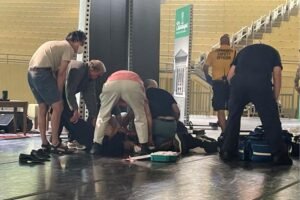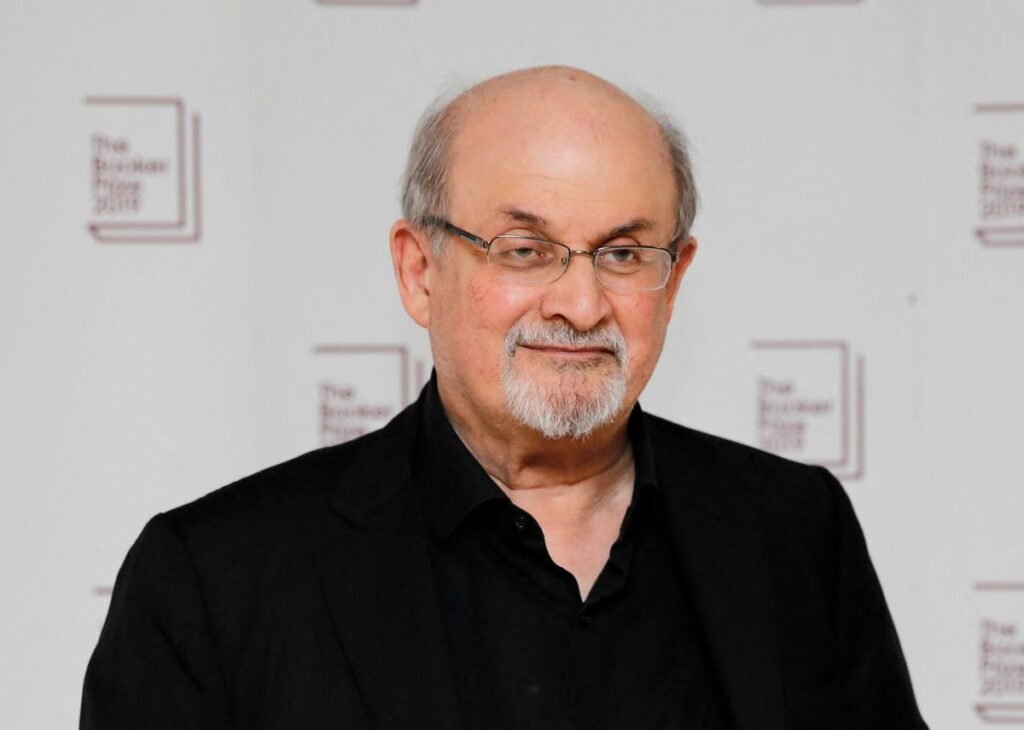The Indian-born novelist Salman Rushdie, who spent years in hiding after Iran urged Muslims to kill him because of his writing, was stabbed in the neck and torso and airlifted to a hospital on Friday, according to police.
Rushdie was on a ventilator and unable to speak on Friday evening after undergoing hours of surgery following an attack that writers and politicians around the world condemned as an assault on free speech.
Andrew Wylie, his book agent, wrote in an email, “The news is bad.” “Salman is likely to lose an eye, the nerves in his arm were severed, and his liver was stabbed and damaged.”
Rushdie, 75, was being introduced to speak to hundreds about artistic freedom at Chautauqua Institution in western New York when a man rushed to the stage and lunged at the novelist, who has lived with a bounty on his head since the late 1980s.
Attendees assisted in removing the man from Rushdie, who had fallen to the ground. The attacker was apprehended by a New York State Police trooper providing security at the event. Hadi Matar, a 24-year-old man from Fairview, New Jersey who purchased a ticket to the event, was identified by the police as the suspect.
BREAKING: Author Salman Rushdie stabbed on stage before a lecture in New York pic.twitter.com/vjhG9HMh0g
— Shiv Aroor (@ShivAroor) August 12, 2022
Bradley Fisher, who was in the audience, described how a man jumped onto the stage from an unknown location and began what appeared to be beating him on the chest with repeated blows to the chest and neck. People were screaming and wailing and gasping for air.
Police say a physician in the audience assisted in Rushdie’s care until emergency services arrived. Henry Reese, who moderated the event, sustained a minor head injury. The police stated that they were collaborating with federal investigators to establish a motive. They did not describe the utilized weapon.
Rushdie, who was born into a Muslim Kashmiri family in Bombay, now Mumbai, before moving to the United Kingdom, has been receiving death threats for his fourth novel, “The Satanic Verses,” for a very long time. According to certain Muslims, the book contained blasphemous passages. Upon its publication in 1988, it was banned in many countries with large Muslim populations.
A few months later, Iran’s supreme leader at the time, Ayatollah Ruhollah Khomeini, issued a fatwa, or religious decree, ordering Muslims to execute the novelist and anyone involved in the book’s publication for blasphemy.

Nearly a decade was spent in hiding by Rushdie, who described his novel as “pretty mild.” The novel’s Japanese translator, Hitoshi Igarashi, was murdered in 1991. The Iranian government announced in 1998 that it would no longer support the fatwa, and Rushdie has since lived a relatively open life.
Millions of dollars have been offered as a reward for Rushdie’s murder by Iranian organizations, some of which are government-affiliated. Ayatollah Ali Khamenei, Khomeini’s successor as supreme leader, stated as recently as 2019 that the fatwa was “irrevocable.”
In 2016, the semi-official Iranian Fars News Agency and other news outlets contributed $600,000 to increase the bounty. In its report on Friday’s attack, Fars described Rushdie as an apostate who had “insulted the prophet.”
“NOT A Typical Author”
In 2012, Rushdie published a memoir titled “Joseph Anton” about his secluded, secretive life under the fatwa. Joseph Anton was the alias he used while under British police protection. The Booker Prize was awarded to the author’s second novel, “Midnight’s Children.” In February, his novel “Victory City” will be published.
Boris Johnson, the British prime minister, was appalled that Rushdie was “stabbed while exercising a right we should never stop defending.”
According to the institution’s website, Rushdie was in western New York for a discussion about the United States providing asylum to artists in exile and as a “home for freedom of creative expression.”
Attendees reported that there were no obvious security checks at the Chautauqua Institution, a landmark founded in the 19th century in the small lakeside town of the same name. Rather, staff checked visitors’ passes for admission.
An Algerian writer and human rights activist in the audience, Anour Rahmani, stated, “I felt we needed more security there because Salman Rushdie is not your typical author.” He is a writer who has a fatwa issued against him.
Michael Hill, the president of the institution, stated at a news conference that the institution routinely collaborates with state and local police to provide event security. He promised that the summer programme would resume shortly.
“Our mission is to help people bridge a world that has been too divided,” Hill said. “The worst thing Chautauqua could do in light of this tragedy would be to abandon its mission, and I don’t believe Mr. Rushdie would want that either.”
Salman Rushdie on ventilator, May lose an eye after attack: Report
In 2016, Rushdie became a U.S. citizen and currently resides in New York City.
He has been an outspoken critic of oppression in his native India, including under the Hindu-nationalist government of Prime Minister Narendra Modi. He describes himself as a former Muslim and a “hard-core atheist.”
Rushdie is a former president of PEN America, a free speech advocacy organization, which stated that it was “reeling from shock and horror” over what it called an unprecedented attack on a writer in the United States.
PEN’s chief executive, Suzanne Nossel, said in a statement, “Salman Rushdie has been targeted for his words for decades, but he has never flinched or faltered.” She stated that Rushdie had emailed her earlier in the morning requesting assistance with relocating Ukrainian writers seeking asylum.
